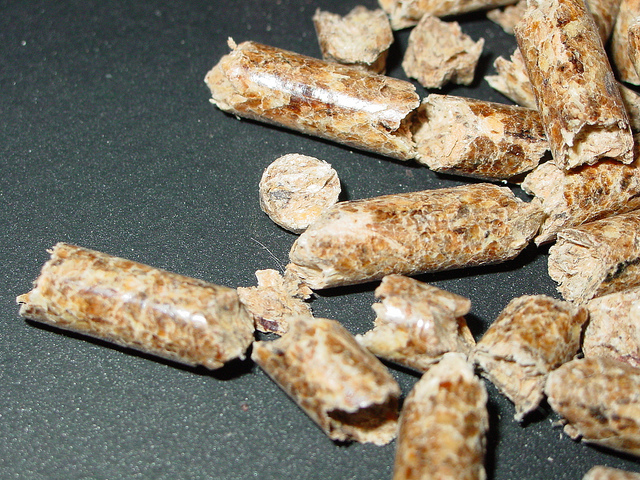Biomass is a big buzz word in the low carbon heating market right now. With the Renewable Heat Incentive (RHI) for commercial properties and the Domestic Renewable Heat Incentive for householders, heating homes and businesses with biomass is becoming economically attractive, as well as being a carbon neutral solution.
The term ‘biomass’ can be somewhat confusing if you haven’t had any direct experience of it. Although most people know it has something to do with wood, the finer details of how biomass can work for you can easily be missed.
Here we aim to give an overview of what biomass is all about, as well as the typical benefits householders can gain from this type of technology.
 Alternative Heat / CC BY 2.0
Alternative Heat / CC BY 2.0
What exactly is biomass?
The term ‘biomass’ is used to describe any biological material that originated in living organisms. In its broadest sense it can be used to describe everything from cow dung to dinosaur bones, but in terms of energy we use biomass to describe plant or tree based materials such as wood.
The wood used in biomass tends to be a little more refined than simply some logs you chopped up in your back garden. Most biomass boilers use either wood chip or densely compacted pellets of wood as fuel, which will have been specifically produced for this type of application. That’s not to say you can’t burn your own logs with biomass, in fact if you install a solid fuel heater such as a wood burner, this is positively encouraged (providing the wood is dry and free from paint and varnish).
The types of biomass heating
There are two main types of biomass heating you can consider for your home:
1. Stoves
Biomass stoves can burn either logs or pellets and provide heat for one room or space. Some stoves can be fitted with a water boiler at the back which can provide hot water to the house as well. The energy rating of these units is usually around 7kW, which is enough to comfortably heat the living area of a typical family home.
2. Boilers
Biomass boilers are much larger and look more industrial, in fact they look much like an oversized gas boiler from the outside. Just like a fossil fuelled boiler these are designed to heat the whole house using radiators, and they usually provide hot water too. These can be log burning boilers, which are stoked by hand, or can run on pellets and be automatically fed by a hopper.
Some biomass heating units are designed to burn any type of biomass fuel, from logs to shavings and wood chips, which can be a great option if you have access to your own supply of wood. If you are looking to replace your current heating system with biomass, the boiler option is the solution for whole house heating, whereas stoves tend to be used in conjunction with other heat sources.
The benefits of biomass
There are many reasons why investing in biomass now can make all the difference. These include:
- With Renewable Heat Incentive payments, payback periods on biomass are a whole lot shorter.
- Savings on fuel costs: The cost of biomass is roughly in line with mains gas at the moment, and as the supply chain expands, the cost is likely to be driven downwards. This is in comparison to the cost of gas, which is tending to go the other way.
- Carbon neutral: Even though CO2 is produced as you burn wood, it is only as much as the tree or plant absorbed during its growing cycle. This is a much more sustainable way of heating than using carbon rich fossil fuels that have been buried for millions of years.
- Promotes biodiversity: By encouraging the use of biofuels, you are helping to encourage the growing of coppices and woodland for fuel. This means there are more natural environments created for our small mammals, birds and insects, promotion healthy levels of biodiversity.
- Social benefits: Locally sourced biomass can help to stimulate local jobs and business opportunities, contributing to your local economy in a much more sustainable way.


